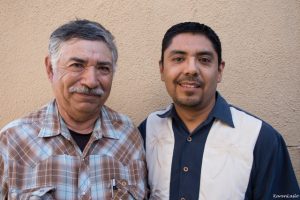by Leslie Layton
It took Sergio C. Garcia longer to become a U.S. citizen than it took for his native country, Mexico, to win independence from Spain.

It took longer than it took for him to win the right to practice law, becoming the nation’s first, so-called undocumented attorney.
Garcia will be sworn in as a U.S. citizen in a ceremony today in Sacramento – the end of a journey that began in 1994 when he was brought to the country as a teen who knew even then that if he was going to live in the United States, he wanted to belong as a participating citizen.
That it took Garcia 25 years to arrive at the belonging he longed for shows how cumbersome the immigration machine can be for people like him who qualify. His story also shows how family ties – one of several ways to qualify for a green card – can be weakened or broken by distance.
(Obtaining the “green card” that grants permanent residency is a prerequisite to becoming a naturalized citizen.)
Ironically, by the time he passed his citizenship exam, Garcia had already won his fight to practice law in a California State Supreme Court case, and he had opened a personal injury practice in Chico, Calif.
Americans often argue that would-be immigrants should “stand in line.” For 42-year-old Garcia, that line consumed most of his life and was a lesson in the cost of family separation.
Garcia is alarmed by President Donald Trump’s talk of ending or dramatically reducing what the president calls “chain migration” – the use of family ties as a qualifying factor and the path used by members of Trump’s family to immigrate. (Immigration and Customs Enforcement has been planning a deportation sweep in coming weeks that could lead to raids on migrant family homes as officers look for undocumented people who have missed a court date or received a removal order.)
The concept of family reunification has been a “cornerstone of immigration law since the late 1800s,” says the Center for American Progress, a Washington, D.C.-based think tank, and by reducing the number of family-based visas, the numbers of black, Latino and even Asian and Pacific immigrants coming to this country would be substantially reduced.
When Sergio was only 9 years old, his father, Salvador Covarrubias, left the family in their impoverished Michoacán village to work as a farm laborer in the Chico area. His father’s absence during eight formative years of his life, Garcia says, damaged the bond between them.
“Once your family is separated, the ties that bind that family change,” Garcia notes. “It scars you for life. I did not have the benefit of having a father figure. We have cried together, my dad and I, and I have told him, ‘It’s not your fault.’”

Once Covarrubias obtained a green card he brought his family to Chico and Sergio applied for permanent residency. His application was approved within a year. That’s when he took his place in the so-called “line.”
Limits are placed on the number of green cards given out in any single year and the wait is especially long for people from Mexico. So even though Garcia was approved for the visa – there was plenty of documentation to support his case — he had to wait as an undocumented immigrant for his assigned number to be included in a visa quota.
Garcia says it became a “religious experience” to check the U.S. State Department’s Visa Bulletin monthly. He soon learned that the line wouldn’t always move in a forward direction; it was more like playing a board game. At one point, he was bounced back by three years because of a change in the law.
His visa became available in 2015, more than 20 years after it had been approved. Garcia then completed a required waiting time — a probationary period that was shortened by his marriage to a U.S. citizen — and applied for citizenship.
For someone as ambitious as Garcia, citizenship opens doors. Garcia says he’s now free to pursue his dream of running for public office. He may launch his political career in what is now his hometown, perhaps running for a local seat. “There’s a lot we can do here in Chico,” Garcia says. “I would like to see a lot of changes happen.”
Sometimes on Fridays, Garcia and his wife Amairani Serna buy extra lunches and distribute them to homeless residents, listening to their stories as they share a meal together. It saddens Garcia that what drove his own family to emigrate – poverty and hunger — afflict so many here.
“It’s incredibly sad to me that the most powerful nation in the world has a homeless problem, has people hungry,” he says.
Leslie Layton is editor of ChicoSol. This story is first in a series on new U.S. citizens.

Thanks for celebrating Sergio Garcia’s successful navigation to the USA immigration maze. The movement of people presents great opportunities for culture to evolve socially, artistically, economically, technically, spiritually, morally, intellectually…Many nations are benefiting by the movement of people into their regions and the USA would be foolish to impede the natural movement of populations.
Will Sergio run for District Attorney?